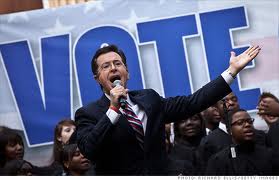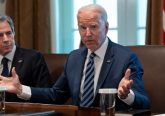 It was a sunny day in March 2011 and Stephen Colbert was getting restless. Colbert had been working out a comedic sketch of a political ad by the former Governor of Minnesota, Tim Pawlenty, but he did not quite know how to end the parody. Then Colbert had an idea: he would substitute ‘LibertyPAC.com,’ the name of Pawlenty’s political action committee, for ‘ColbertPAC.com’ and would buy the URL in jest. Almost immediately after the episode aired, Colbert received a frantic call from the Comedy Central network, which had evidently bought the joke and insisted that he refrain from forming ColbertPAC. The Federal Election Campaign Act (FECA), passed by Congress in the early 1970s, had made it a federal offense for PACs to accept money from corporations, and Viacom — the corporate owner of Colbert’s network — feared that it would face accusations of making illegal in-kind contributions should ColbertPAC become a fully functioning money-raising PAC.
It was a sunny day in March 2011 and Stephen Colbert was getting restless. Colbert had been working out a comedic sketch of a political ad by the former Governor of Minnesota, Tim Pawlenty, but he did not quite know how to end the parody. Then Colbert had an idea: he would substitute ‘LibertyPAC.com,’ the name of Pawlenty’s political action committee, for ‘ColbertPAC.com’ and would buy the URL in jest. Almost immediately after the episode aired, Colbert received a frantic call from the Comedy Central network, which had evidently bought the joke and insisted that he refrain from forming ColbertPAC. The Federal Election Campaign Act (FECA), passed by Congress in the early 1970s, had made it a federal offense for PACs to accept money from corporations, and Viacom — the corporate owner of Colbert’s network — feared that it would face accusations of making illegal in-kind contributions should ColbertPAC become a fully functioning money-raising PAC.
By then Colbert had become very fond of the idea of forming ColbertPAC as an educational experiment to see what PACs could do to influence the 2012 election. So he invited Trevor Potter, his personal attorney and former Federal Election Commission chairman, on his show to ask whether ColbertPAC could become a reality without incurring legal liability. Colbert quickly learned that the Supreme Court’s landmark 2010 decision in Citizens United v. Federal Election Commission — which has given rise to something called a “Super PAC” — would make this and much more possible.
Citizens United overturned a century of legal doctrine when it ruled that pursuant to the Free Speech Clause of the First Amendment, corporations and labour unions have the right to spend unlimited amounts of money through ads, commercials and other political tools to support or oppose candidates for office. Expenditures by corporations, unions or individuals on political speech, the Supreme Court explained, cannot corrupt electoral integrity provided that they are made independently of election campaigns. The trouble began with the implementation of the Court’s decision in July 2010, when the Federal Election Commission, which regulates and enforces campaign finance legislation in the US, created a new class of political fundraising groups called “independent expenditure-only committees” — now known as ‘Super PACs’. Unlike traditional PACs, Super PACs can lawfully raise and spend unlimited amounts of money to endorse or oppose candidates. And since Super PACs are, by definition, “independent expenditure-only committees,” corporations can funnel as much money to them as they please.
There are only two rules: Super PACs must report their donors to the FEC, and they cannot coordinate with or give money directly to candidates or political parties. If all this seems easy enough in theory, think about it in practice. Restore our Future, the super PAC which secured the former Massachusetts Governor Mitt Romney’s victory against ex-House Speaker Newt Gingrich and outspent Romney’s own campaign in that state nearly 2-1, is run by three former Romney political aides, who worked for him during his 2008 presidential bid. Priorities USA, a super PAC that supported President Obama, is under the directorship of a former White House spokesman. The FEC’s rule against coordination, it seems, was meant to be broken, and often.
Back on The Colbert Report, Colbert filled out paperwork and sealed it with his signature, thus giving birth to the fully functioning and fully legal ‘Colbert Super PAC’. With Trevor Potter by his side, Colbert then discovered that he could easily and lawfully circumvent rule number two — the FEC’s requirement that Super PACs disclose their donors — first, by starting a nonprofit under Section 501(c)(4) of the tax code, and second, by creating an anonymous shell corporation. Like a Super PAC, a 501(c)(4) can raise unlimited money, but it does not have to disclose its donors, which, unsurprisingly, has resulted in much greater amounts of corporate funds being funneled to these groups first, then to Super PACs. An even simpler way for donors to keep their identities secret is through the creation of a shell corporation—an untraceable structure that can funnel donations to Super PACs while keeping the ultimate source of the money hidden. What is the difference between this and money laundering? In the words of Trevor Potter, “It’s hard to say.”
The United States emerged from the idea that the authority to govern comes not through God, primogeniture, or a monopoly on force, but from the people, when they engage in free and open elections. By authorizing unbridled corporate electioneering and allowing donors to conceal their tracks, Citizens United threatens to damage the very root of American democracy. Short-term solutions such as legislation to force full disclosure can be a start. But if we want to restore and deepen democracy in America, the true solution begins with overturning Citizens United.
Natalie Punchak is a MPP student at the Blavatnik School of Government, Oxford.
This post is part of our Deepening Democracy series, responding to a September 2012 report by the Global Commission on Elections, Democracy and Security, on improving the integrity of elections. The series is being curated by the Blavatnik School of Government and hosted on Politics in Spires. It features contributions from students on the Master of Public Policy course at the Blavatnik School, as well as guest posts from Oxford and Cambridge scholars in politics and international relations.








No Comment